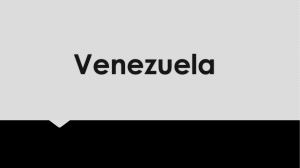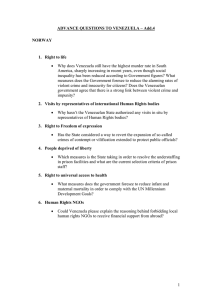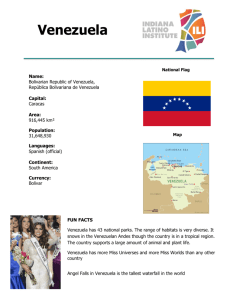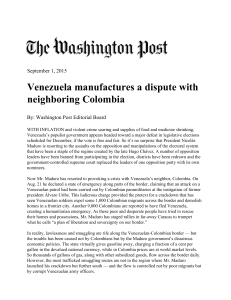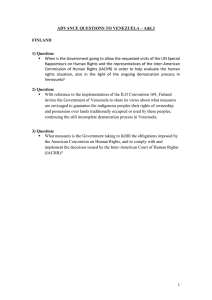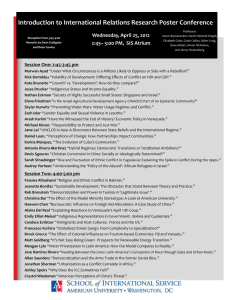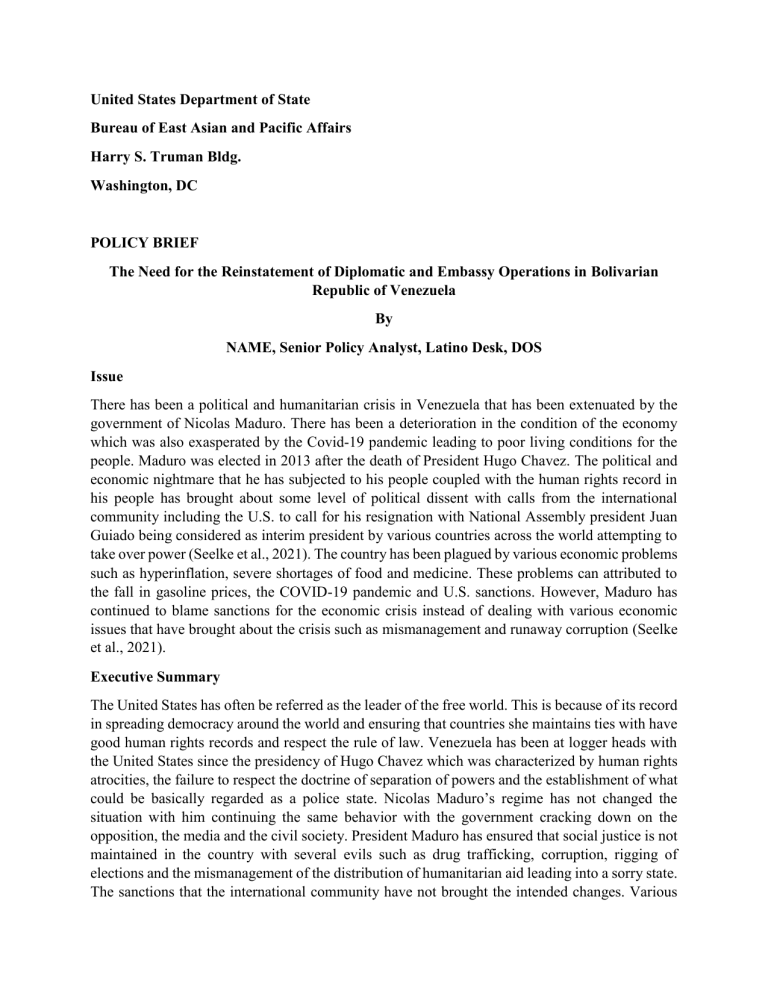
United States Department of State Bureau of East Asian and Pacific Affairs Harry S. Truman Bldg. Washington, DC POLICY BRIEF The Need for the Reinstatement of Diplomatic and Embassy Operations in Bolivarian Republic of Venezuela By NAME, Senior Policy Analyst, Latino Desk, DOS Issue There has been a political and humanitarian crisis in Venezuela that has been extenuated by the government of Nicolas Maduro. There has been a deterioration in the condition of the economy which was also exasperated by the Covid-19 pandemic leading to poor living conditions for the people. Maduro was elected in 2013 after the death of President Hugo Chavez. The political and economic nightmare that he has subjected to his people coupled with the human rights record in his people has brought about some level of political dissent with calls from the international community including the U.S. to call for his resignation with National Assembly president Juan Guiado being considered as interim president by various countries across the world attempting to take over power (Seelke et al., 2021). The country has been plagued by various economic problems such as hyperinflation, severe shortages of food and medicine. These problems can attributed to the fall in gasoline prices, the COVID-19 pandemic and U.S. sanctions. However, Maduro has continued to blame sanctions for the economic crisis instead of dealing with various economic issues that have brought about the crisis such as mismanagement and runaway corruption (Seelke et al., 2021). Executive Summary The United States has often be referred as the leader of the free world. This is because of its record in spreading democracy around the world and ensuring that countries she maintains ties with have good human rights records and respect the rule of law. Venezuela has been at logger heads with the United States since the presidency of Hugo Chavez which was characterized by human rights atrocities, the failure to respect the doctrine of separation of powers and the establishment of what could be basically regarded as a police state. Nicolas Maduro’s regime has not changed the situation with him continuing the same behavior with the government cracking down on the opposition, the media and the civil society. President Maduro has ensured that social justice is not maintained in the country with several evils such as drug trafficking, corruption, rigging of elections and the mismanagement of the distribution of humanitarian aid leading into a sorry state. The sanctions that the international community have not brought the intended changes. Various U.S. presidents have sought various measures to ensure that they put the necessary pressure to the government for the sake of its citizens. President Donald Trump’s administration sought to exert diplomatic, economic and legal pressure on the presidency in order for Maduro to leave office and agree to the setting up of a transition government in the preparation of free, fair and verifiable elections. They sought to bring back democracy and the rule of law into the country but were unsuccessful. Currently, the Biden administration has put focus on the humanitarian crisis in the country and is supporting the Venezuelan people get back on their feet while also using various diplomatic tactics that would help hold President Maduro in check and help in the promotion of a return to democracy. However this methods have often bore fruits. Maduro continues with his authoritarian regime as the international community develops various strategies to effect change in the country. With Venezuela being strategically located in South America and being rich in various natural resources such as natural gas and oil, it is my opinion that it is time to restore diplomatic ties with the country in order to create an avenue that would help steer Venezuela into political and economic stability. The U.S. has an obligation to help end the political, economic and humanitarian crisis in Venezuela. This policy brief provides an analysis of U.S. foreign policy towards Venezuela and provides recommendations on more effective policies that would help transform the nation and end the suffering of the people of Venezuela. Background President Donald Trump instituted a policy after the fraudulent and disputed elections of 2018. In these elections, President Maduro was accused of various electoral malpractices. This led to the government ceasing to recognize the legitimacy of the Maduro in January 2018. The president had even considering using military force to remove Maduro but late decided to use diplomatic, economic and legal pressure to compel him to leave power. By the end of President Trump’s term, this strategy had not worked. President Biden’s administration has chosen a new approach that focuses on the people of Venezuela and their needs and diplomatic efforts to press for democratic change and accountability in the government. To support this strategy, the administration designated Venezuela for Temporary Protected Status in March 2021. Further, the administration is reviewing the impact of its sanctions on Venezuela (Seelke et al., 2021). The Maduro regime has recorded a deterioration in the standard of living on the people and a disrespect for human rights and the rule of law. Various sanctions imposed on them has brought about the collapse of the economy. High levels of corruption have increased the impact of the state of the economy on the citizens. This has led to some people to engage in dissent and protests especially after the 2018 election. The U.S. and the international community continues to recognize Interim President Juan Guaido and considers the 2015 democratically elected Venezuelan National assembly that he leads the only legitimate federal institution according to the Venezuelan Constitution (U.S. Department of State, 2020). This recognition has often frustrated the diplomatic efforts made in this country in order to ensure change in this country. The political situation continues to be in a dire state with opposition leaders being persecuted due to their stands against the government. The police and other security apparatus are often used to intimidate members of the opposition leading to various violations of human rights. According to the State Department, the U.S. continues to be in a concerted effort to restore democracy in the nation via free and fair elections. There are various areas of mutual concern and benefit to both countries that make it important for the nations to improve their relations. These issues include public health, security, anti-narcotics trafficking initiatives and the reestablishment of the rule of law (U.S. Department of State, 2020). With the world also facing an unprecedented war in Russia, it would also be extremely beneficial to halt the hostilities in Venezuela in order to reduce the dependence on Russian oil that has driven oil prices high and brought about oil shortages all over the world. It is clear, that Venezuela would act as a key ally of the U.S. states in key issues of concern. However, it is important to gauge how much the country is ready to cede and how much effort the country should put in order to ensure the interests of the Venezuelan people are taken care of. U.S Interests in Venezuela According to Moises Rendon, a senior associate at the Center for Strategic and International Studies, a major crisis in the neighborhood cannot be overlooked. Venezuela is around 1300 miles from the coast of Florida and its collapse creates security, financial and economic risks for the U.S. and could trigger region-wide consequences if not adequately dealt with. With the country also being a conduit for narco trafficking and international terrorism, there is sufficient evidence that instability in Venezuela poses a serious challenge in the region (Rendon, 2021). There is need for unified international action to increase pressure on the Maduro regime in order to enact change in his country. It would be wise to employ various strategic diplomatic actions that would help convince Maduro and his inner circle the wisdom of a return to democracy and the need for respect for human rights and fighting corruption in the country (Rendon, 2021). Understanding why this is a priority for the U.S is important in the face of a looming crisis in the region is key to developing effective strategy. Policy Recommendations Over the last few decades, the U.S. over various administrations has watched as Venezuela has sunk deeper into political and economic oblivion and a humanitarian crisis. Its strategy of sanctions and diplomatic pressure has worsened the situation due to the Venezuelan government’s hard stance against the U.S. and its influence in the region. It is clear that these strategies have not been working and have led to more suffering for the people of Venezuela. It is my opinion that the efforts by successive governments have borne no fruits and it is time to shift gears. The U.S. needs to concede that it has failed in its efforts and first ease some of the sanctions against the country. Diplomacy is a give and take and with proper mediation, the U.S. can influence change in the country by ensuring that it does not concede too much to Nicolas Maduro. These concessions should include easing of some of the economic sanctions, increasing international aid and international development programs for the country in exchange for human rights considerations, free and fair elections and tackling of corruption, terrorism and narcotics trafficking in the region. This will increase opportunities for the people of Venezuela and improve their standard of living. Gradual engagement with the Maduro regime will bring about progress in the fight to the return to democracy for Venezuela. Key Talking Points The U.S. is committed to a peaceful and stable Latin America. Venezuela poses a security challenge in this region and should be considered in the maintenance of the regions peace and security. The U.S. is committed to the maintenance of democracy and human rights in the region and needs to commit itself in advocating for the rights of the Venezuelan people. The welfare of the Venezuelan people is essential in the peace and stability of the region. Any diplomatic efforts need to consider the humanitarian implications of any decision taken. The U.S. is committed to peaceful diplomacy with Venezuela and emphasizing political, security, and economic cooperation instead of military posturing. References Rendon, M. (2021, May 27). Why Venezuela should be a U.S. foreign policy priority. Why Venezuela Should Be a U.S. Foreign Policy Priority | Center for Strategic and International Studies. Retrieved April 6, 2022, from https://www.csis.org/analysis/why-venezuela-should-beus-foreign-policypriority#:~:text=A%20stronger%20and%20safer%20region%20is%20in%20U.S.,and%20develo pment%20has%20been%20key%20for%20the%20region. Seelke, C. R., Nelson, R. M., Margesson, R., & Brown, P. (2021). Venezuela: Background and U.S. Relations Updated April 28, 2021. Congressional Research Service. U.S. Department of State. (2020, December 1). U.S. relations with Venezuela - United States Department of State. U.S. Department of State. Retrieved April 6, 2022, from https://20172021.state.gov/u-s-relations-with-venezuela/index.html U.S. Department of State (2021, March 8) Background Press Call by Senior Administration Officials on Venezuela press briefing. U.S. Department of State. (2022, March 10). U.S. relations with Venezuela - United States Department of State. U.S. Department of State. Retrieved April 6, 2022, from https://www.state.gov/u-s-relations-withvenezuela/#:~:text=The%20United%20States%20maintains%20diplomatic%20relations% 20with%20Venezuela.,Bogota%2C%20Colombia%2C%20is%20the%20U.S.%20Mission %20to%20Venezuela.
